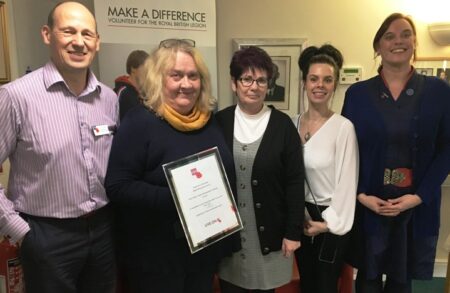Home News & Views The art of remembrance
The art of remembrance

Louise Brady
Lister House Care home nestles against the beautiful North Yorkshire landscape, just on the outskirts of the historic small city of Ripon.
The Royal British Legion has six beautiful care homes across various part of the UK. What connects all our families and their residents is their previous service within the armed forces. For many, the experience of serving in the armed forces has been life changing, and central to who they are as a people. The residents I have met have told me that the camaraderie brings a source of friendship, community, purpose and pride.
Equally, some find aspects of their military backgrounds deeply upsetting and are unwilling to talk about it, even traumatic events which occurred many years ago. As a registered nurse, I feel extremely humbled and privileged to get the opportunity to learn about people’s lives; being aware of this and sensitive to possible past trauma and bereavement can help solidify strong therapeutic relationships.
In recent weeks, the media coverage of care homes has been unprecedented, amidst the Corona virus pandemic. Journalists have painted a horrific image of care homes and their staff. The care home sector has been described as ‘squalid’, ‘dilapidated’ and their staff as ‘low skilled’. Nothing could be further from the truth. Whilst across the country there have been good and bad examples of care, the narrative has generally been extrapolated from those who have neither a wide breath nor depth of experience of care homes generally. Living in a care setting is not perceived to equate with a decent quality of life, and I find this to be an inaccurate and insidious perception not least because for the majority of homes, this is indeed not the case, and if echoed through society it could become a dangerous narrative.
I believe all our residents must be treated with the upmost dignity and respect and not be perceived by some media circles as mere ‘passive recipients of care’ but indeed as the active partners that they are.
Meet Ben Tyler from Lister House. Ben cuts a stark and strong figure of a man in real life, with a wicked sense of humour. Ben has a fascinating personal and military history. I was both humbled and privileged to spend some time with Ben and the team at Lister and to learn about his life, his interests and his aspirations. Although Ben has physical challenges, he is far from being a passive recipient of care. Steve Kay, our dedicated and industrious registered home manager, tells me Ben sits on Lister’s residents’ council. The council meet regularly with the staff to decide how their home is run. Usually, this encompasses everything from involvement in training new staff members, to improving choice of menus, support for local events, social activities and outings, amongst the many day-to-day aspects of home life.
Steve tells me Ben was part of the interview panel before Steve was successfully appointed as Lister home manager. Steve laughs and announces that straight away he and Ben ‘clicked’ and ‘connected’. This was made easier as the pair had plenty in common. Ben had served in Africa and Saudi Arabia and Steve had also worked in Saudi, and both spoke some Arabic. So the interview was led by Ben in part Arabic and part North Yorkshire dialect!
Lister House cares for and with, a diverse group of residents from varying socio-economic backgrounds. It boasts a vibrant multi faith chapel, a choir, a bar, many clubs and associations and in recent years has achieved local accolades for its work on inclusion and diversity in partnership with the local LGBT community.
The team at Lister are compassionate, caring and expertly skilled, and come together in partnership with all their residents. In addition, they have invested in a full complement of care and nursing staff and have two dynamic deputy nurse managers in Ged, and Laura. Their interests span excellence in person centred care, optimising palliative care and treatment, and supporting mental health and wellbeing.
In April this year, Lister was sadly struck by the Corona virus pandemic. Grief and sadness descended, as residents began self-isolating in their rooms, activities and social events ceased and we sadly had to face the death of residents who had become part of our extended family.
Sally Hanby our wonderful practice development lead, identified how visibly upset both staff and residents were becoming, and decided to take action. She is definitely the ‘moral compasses of the home’ and has created the ‘find your mojo club’ which helps create a safe space commitment for staff to talk about their feelings, supporting coping mechanisms, staff stress and resilience. At the same time, Ben Tyler is ‘watching out for residents with sad eyes’ who may need a chat and a hand to hold, as they are missing their relatives and loved ones. This is the real raw and beautiful reality of care homes, and partnership work at its very best.
Last week, there was a small but socially distanced memorial service for one of the residents. Ged the deputy home manager tells me about the ‘Pause…’ developed by Lister in partnership with Ben Tyler and the nursing staff. You can read about it here.
The care home sector is under immense pressure and public scrutiny. Each of our care homes are unique vibrant communities, with a heart, soul and imagination, that is brought to life by the its people. The Royal British Legion’s work starts at the heart of remembrance. Let us remember the great expertise dedication and care that happens in our homes each and every day.
With sincere thanks to Ben Tyler, Steve Kay Sally Hanby and Ken Perry for inspiring this blog.
Louise Brady is the clinical Nurse Development lead, supporting the Legion’s six Care Homes.
Comments are closed.

